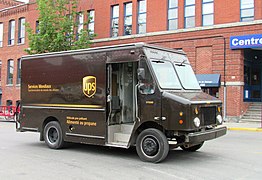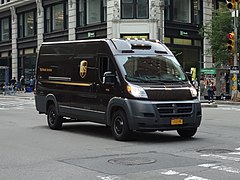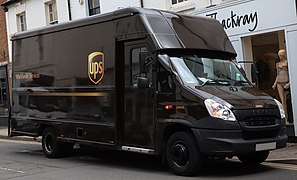United Parcel Service
United Parcel Service, Inc. (UPS) is an American multinational shipping & receiving and supply chain management company founded in 1907.[1] Originally known as the American Messenger Company specializing in telegraphs, UPS has grown to become a Fortune 500 company[6] and one of the world's largest shipping couriers. UPS today is primarily known for its ground shipping services as well as the UPS Store, a retail chain which assists UPS shipments and provides tools for small businesses. UPS offers air shipping on an overnight or two-day basis and delivers to post office boxes through UPS Mail Innovations and UPS SurePost, two services that pass on packages to the United States Postal Service for last-mile delivery.[7][8]
This article is about the courier company. For the mailing service operated by the U.S. federal government, see United States Postal Service.Formerly
American Messenger Company (1907–1913)
Merchants Parcel Delivery (1913–1919)
August 28, 1907 in Seattle, Washington, U.S. as the American Messenger Company
Sandy Springs, Georgia, U.S.
Worldwide
![]() US$90.96 billion (2023)
US$90.96 billion (2023)
![]() US$9.141 billion (2023)
US$9.141 billion (2023)
![]() US$6.708 billion (2023)
US$6.708 billion (2023)
![]() US$70.86 billion (2023)
US$70.86 billion (2023)
![]() US$17.31 billion (2023)
US$17.31 billion (2023)
c. 500,000 (2023)
- UPS Airlines
- Nightline Group
- Marken
- UPS Logistics
- UPS Mail Innovations
- UPS Professional Solutions
- UPS i-parcel
UPS is the largest courier company in the world by revenue, with annual revenues around US$85 billion in 2020, ahead of competitors DHL and FedEx.[9] UPS's main international hub, UPS Worldport in Louisville, Kentucky, is the fifth busiest airport in the world by cargo traffic based on preliminary statistics from ACI, and the third busiest in the U.S. behind FedEx's Memphis Superhub and Ted Stevens Anchorage International Airport.[10] The company is one of the largest private employers in the United States.[11]
Competitors[edit]
Major competitors in the United States include the United States Postal Service (USPS) and FedEx, along with regional carriers such as OnTrac, and LSO (formerly Lonestar Overnight). In addition to these domestic carriers, UPS competes with a variety of international operators, including SF Express, Canada Post (and its subsidiary Purolator), TransForce, Deutsche Post (and its subsidiary DHL), Royal Mail, Japan Post Service, and many other regional carriers, national postal services and air cargo handlers (see Package delivery and Mail pages).
Historically, the bulk of competition for UPS came from inexpensive ground-based delivery services, such as Parcel Post (USPS) or Choice Logistics. In 1998, FedEx expanded into ground parcel delivery through its acquisition of RPS (formerly Roadway Package System), rebranding it as FedEx Ground in 2000. In 2003, DHL acquired Airborne Express, expanding its operations in the United States.
In response to the expansion of FedEx and DHL, UPS partnered with the US Postal Service to offer UPS Mail Innovations,[92] a program that allows UPS to pick up mail and packages weighing under one pound separately from the main ground network and transfer them to a USPS center, or destination delivery unit (DDU),[93] for final distribution. This process is also known as zone skipping,[94] long used by parcel consolidators.[95] UPS also has a separate product called "SurePost" which uses the UPS Ground network to deliver packages weighing under 10 pounds to the nearest UPS Package Center, which transfers them to the USPS DDU for "final mile" delivery.[96]
More recently, the continued growth of online shopping, combined with increasing awareness of the role of transportation (including package delivery) on the environment, has contributed to the rise of emerging competition from niche carriers or rebranded incumbents. For instance, the US Postal Service claims "greener delivery" of parcels on the assumption that USPS letter carriers deliver to each US address, six days a week anyway, and therefore offer the industry's lowest fuel consumption per delivery. Other carriers, like ParcelPool.com,[97] which specializes in residential package delivery to APO/FPO addresses, Hawaii, Alaska, Puerto Rico, and other US Territories, arose in response to increased demand from catalog retailers and online e-tailers for low-cost residential delivery services closely matching service standards normally associated with more expensive expedited parcel delivery.
In 2019, UPS sued in an attempt to force USPS to raise their prices, but was rejected by the Supreme Court.[98]






